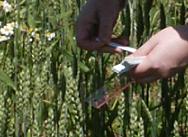 The Enemy Release Hypothesis (sensu Elton) is one of the key hypotheses explaining the success of invasive species. If invasives commonly escape their enemies and if this enemy release is responsible for their dominance over natives, then excluding enemies may help level the playing field and increase native plant abundance. We established long-term enemy exclosures in swamps, old fields, forests, and restored grasslands to test how enemies influence the relative abundance of native vs. exotic plant species.Many of these exclosures were constructed in public areas and Dave Williams (Lawton High School) is currently developing signage and activities for citizen scientists of all ages to engage in their own data collection on a subset of our plots.
The Enemy Release Hypothesis (sensu Elton) is one of the key hypotheses explaining the success of invasive species. If invasives commonly escape their enemies and if this enemy release is responsible for their dominance over natives, then excluding enemies may help level the playing field and increase native plant abundance. We established long-term enemy exclosures in swamps, old fields, forests, and restored grasslands to test how enemies influence the relative abundance of native vs. exotic plant species.Many of these exclosures were constructed in public areas and Dave Williams (Lawton High School) is currently developing signage and activities for citizen scientists of all ages to engage in their own data collection on a subset of our plots.
Cristy Portales Reyes Wins ACS Poster Prize
Summer 2012 researcher Cristy Portales Reyes wins best undergraduate poster prize at American Chemical Society annual meeting for her and Tina’s work on how garlic mustard allelochemicals affect native legume-rhizobium interactions. Tina also presented at the West Michigan Regional Undergrad Science Research Conference.
Paper on Microbes Helping Plants Adapt Featured on Radio
Jay Lennon’s and Jen’s paper on how microbes help plants adapt to changing climates featured on German public radio (click here for mp3 broadcast) and on Greening of the Great Lakes (click here for mp3 broadcast).